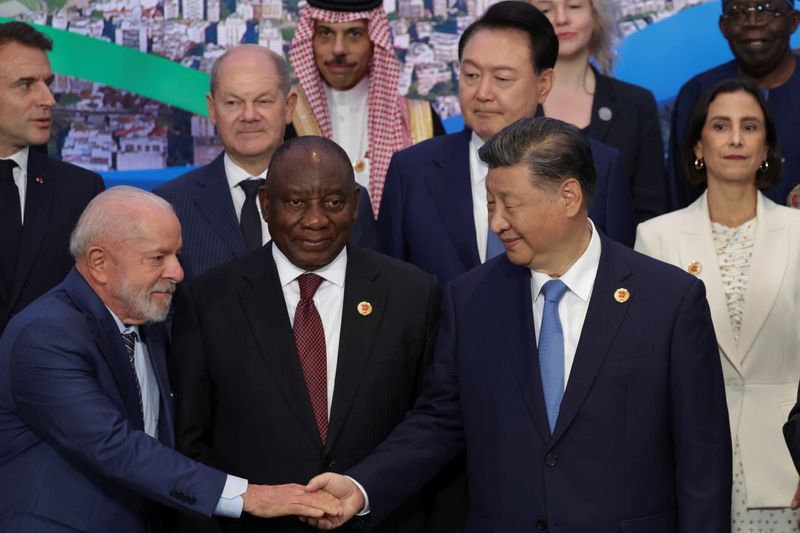China's Xi visits Brasilia to cap tour flexing diplomatic clout
By Eduardo Baptista and Lisandra Paraguassu
RIO DE JANEIRO (Reuters) - Chinese President Xi Jinping's state visit to Brasilia on Wednesday caps a diplomatic blitz across South America that has shown Beijing's growing clout in the region and at global forums where it filled a gap left by the U.S. presidential transition.
Xi and Brazilian President Luiz Inacio Lula da Silva are expected to sign agreements boosting trade and cooperation across sectors from agribusiness to energy and aerospace during morning meetings at the presidential residence in Brasilia.
The accords between the major developing economies with some $180 billion of bilateral trade come after twin summits for Xi in one week - the Asia-Pacific Economic Cooperation forum in Lima and then the Group of 20 major economies in Rio de Janeiro.
While Xi played a central role at both summits, U.S. President Joe Biden arrived as a lame duck with just two months left in the White House and little room for lasting pledges, as his successor Donald Trump vows a total foreign policy overhaul.
A group portrait on the first day of the G20 summit captured the moment, with Xi front and center, next to the presidents of Brazil, India and South Africa - China's partners in the BRICS group of major developing nations and the three consecutive G20 hosts from 2023 to 2025.
Biden missed that photo op for "logistical reasons," the White House said.
With Biden diminished and Trump averse to multilateralism, diplomats and foreign policy experts said Xi's charm offensive was filling a vacuum in an unsettled global order.
China's side meetings with Western powers amid trade and geopolitical tensions, from the U.S. and Britain to France and Germany, showed a conciliatory turn from Beijing ahead of four more rocky years facing down Trump, said Li Xing, a professor at the Guangdong Institute for International Strategies
"China's strategy is clear, the posture it is displaying is to let go of past resentment," said Li. "This is definitely an adjustment, and it's all because this year's G20 summit is in a transition period following the U.S. election."
Behind the scenes, several diplomats who had been part of previous G20 summits noticed an evolving posture from the Chinese - less focused on their own narrow interests and more proactive about forging a wider consensus.
"China is much more participative and much more constructive," said one Brazilian diplomat, requesting anonymity to discuss the negotiations.
A European diplomat noted that Chinese peers helped to build consensus this year on several fronts, including topics such as women's rights where they had not been traditionally active. It looked like a conscious move to occupy a multilateral forum that Trump is likely to neglect, the diplomat added.
"A place left unoccupied will be occupied by another," said the European diplomat. "Apparently China is interested in occupying more than it has to date."
Source: Investing.com
